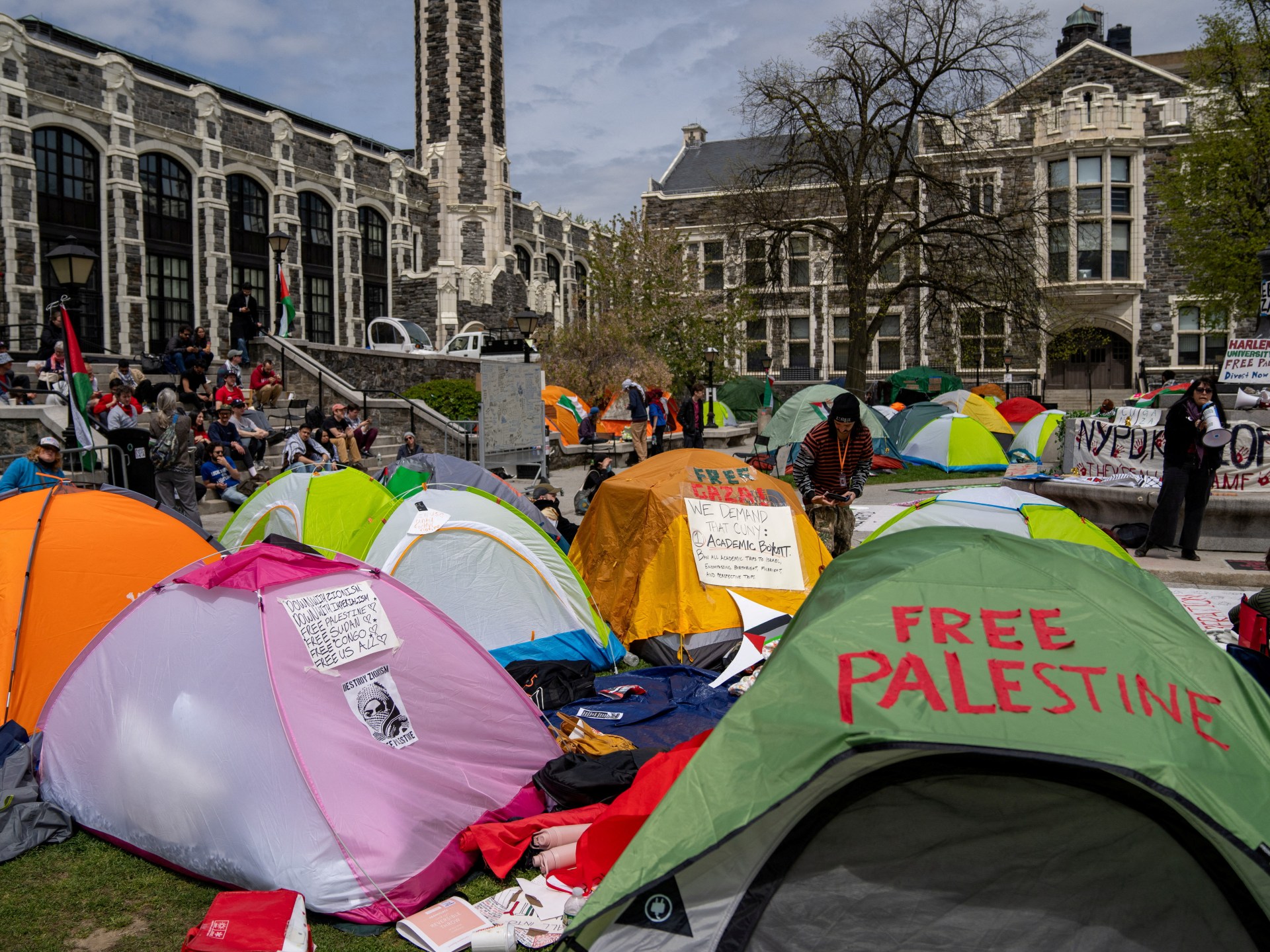
The United States House of Representatives has overwhelmingly passed a bill that would expand the federal definition of anti-Semitism, despite opposition from civil liberties groups.
The bill passed the House on Wednesday by a margin of 320 to 91, and it is largely seen as a reaction to the ongoing antiwar protests unfolding on US university campuses. It now goes to the Senate for consideration.
If the bill were to become law, it would codify a definition of anti-Semitism created by the International Holocaust Remembrance Alliance (IHRA) in Title VI of the Civil Rights Act of 1964.
That is a federal anti-discrimination law that bars discrimination based on shared ancestry, ethnic characteristics or national origin. Adding IHRA’s definition to the law would allow the federal Department of Education to restrict funding and other resources to campuses perceived as tolerating anti-Semitism.
But critics warn IHRA’s definition could be used to stifle campus protests against Israel’s war in Gaza, which has claimed the lives of 34,568 Palestinians so far.
What is the definition?
IHRA’s working definition of anti-Semitism is “a certain perception of Jews, which may be expressed as hatred toward Jews. Rhetorical and physical manifestations of anti-Semitism are directed toward Jewish or non-Jewish individuals and/or their property, toward Jewish community institutions and religious facilities”.
According to the IHRA, that definition also encompasses the “targeting of the state of Israel, conceived as a Jewish collectivity”.
The group also includes certain examples in its definition to illustrate anti-Semitism. Saying, for instance, that “the existence of a State of Israel is a racist endeavor” would be deemed anti-Semitic under its terms. The definition also bars any comparison between “contemporary Israeli policy” and “that of the Nazis”.
However, IHRA does specify that “criticism of Israel similar to that leveled against any other country cannot be regarded as anti-Semitic”.
Bipartisan criticism
Rights groups, however, have raised concerns the definition nevertheless conflates criticism of the state of Israel and Zionism with anti-Semitism.
In a letter sent to lawmakers on Friday, the American Civil Liberties Union (ACLU) urged House members to vote against the legislation, saying federal law already prohibits anti-Semitic discrimination and harassment.
The bill is “therefore not needed to protect against anti-Semitic discrimination”, the letter said.
“Instead, it would likely chill free speech of students on college campuses by incorrectly equating criticism of the Israeli government with anti-Semitism.”
Those fears were echoed within the House of Representatives itself. During a hearing on Tuesday, Representative Jerry Nadler, a Democrat, said the scope of the definition was too broad.
“By encompassing purely political speech about Israel into Title VI’s ambit, the bill sweeps too broadly,” he said.
Representative Thomas Massie, a Republican, also criticised the bill in a post on the social media platform X, noting that it only referred to the IHRA definition, without providing the exact language or stating clearly which parts would be enshrined into law.
“To find the legally adopted definition of anti-Semitism, one must go to [the IHRA website],” he wrote.
“Not only is the definition listed there, but one also finds specific examples of anti-Semitic speech. Are those examples made part of the law as well?”
Concerns on campus
The IHRA adopted its current definition of anti-Semitism in 2016, and its framing has been embraced by the US State Department under President Joe Biden and his two predecessors.
The vote on Wednesday comes as renewed protests have swept across college campuses in opposition to Israel’s war in Gaza. April has seen the spread of encampments on university lawns, as students call for university leaders to divest from Israel and for government officials to call for a ceasefire.
The Biden administration and other top Washington officials have pledged steadfast support for Israel, despite mounting humanitarian concerns over its military campaign.
US lawmakers also have upped the pressure on university administrators to quash the protests, which they have portrayed as inherently anti-Semitic.
Protest leaders across the country, however, have rejected that characterisation. Instead, they accuse administrators and local officials of conflating support for Palestinians with anti-Semitism.
They also have said their rights are being trampled by administrators who seek to appease lawmakers, prompting at times violent police crackdowns on the encampments.
On Tuesday, House Speaker Mike Johnson announced that several House committees would be tasked with a probe into alleged campus anti-Semitism. But critics fear the investigation could ultimately threaten to withhold federal research grants and other government support from the universities where the protests are occurring.
Read More: World News | Entertainment News | Celeb News
Al Jazeera









